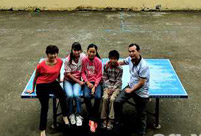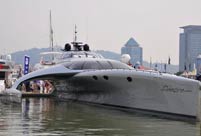Just over 10 years since major Chinese reform gave private enterprises greater play in the arts industry, such companies are struggling to survive in a sector that they say is under-regulated and dominated by state-run troupes.
As the ongoing 10th China Arts Festival focuses attention on this field, private troupes are reporting that despite the industry's boom, lack of oversight is allowing unscrupulous operators to stage cheap, shoddy productions. These both make greater profits than quality shows and drive disappointed audiences away from the arts.
Undercut by their copycats, upmarket private arts enterprises are meanwhile finding it hard to compete against better-funded state-run groups.
"Performance management companies usually survive for no more than three years. That's even shorter for private troupes," says Li Xiaojie, general manager of Shenzhen-based Oriental Charm Culture-Transmitting Co., Ltd..
Li and her husband have run their private performance management firm for 10 years, a period in which its registered capital has been raised from 500,000 yuan (82,000 U.S. dollars) to 10 million yuan.
The company's development reflects China's decade-long cultural sector reform that began in 2002. At the 16th Communist Party of China National Congress in November 2002, non-profit cultural undertakings and the commercial cultural industry were separated.
The government initiated a reform of printing houses, film studios, newspapers, radio and TV stations as well as arts troupes, bringing those formerly government-affiliated agencies to the market.
The cultural industry has since become a new growth point for the country's economic development. In 2012, the industry's total output value exceeded 4 trillion yuan, with exports of cultural products amounting to 21.73 billion U.S. dollars.

 No news of survivors in Lao Airlines crash
No news of survivors in Lao Airlines crash China's destroyer Qingdao sails out of Sydney Harbor
China's destroyer Qingdao sails out of Sydney Harbor Chinese tycoon aims to restore London's Crystal Palace
Chinese tycoon aims to restore London's Crystal Palace Admirers to bid joyful goodbye to Rubber Duck
Admirers to bid joyful goodbye to Rubber Duck Photo story: For the last three students
Photo story: For the last three students  Photo story: A day in the life of a car model
Photo story: A day in the life of a car model Chinese screen goddesses from Beijing Film Academy
Chinese screen goddesses from Beijing Film Academy  Weekly Sports Photos
Weekly Sports Photos World's most amazing yacht on display in Guangzhou
World's most amazing yacht on display in Guangzhou Photo collection of Chinese Navy
Photo collection of Chinese Navy Cold air sweeps through N China
Cold air sweeps through N China The last family in shantytowns
The last family in shantytowns UNESCO world heritage site: Montale Tower
UNESCO world heritage site: Montale Tower U.S. Senate leader announces bipartisan deal
U.S. Senate leader announces bipartisan deal Fiber-optic wedding dress show shinning in Suzhou
Fiber-optic wedding dress show shinning in Suzhou Day|Week|Month